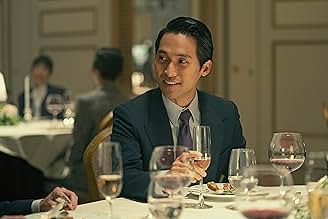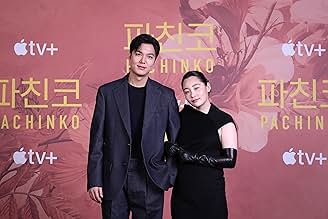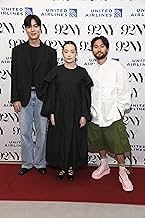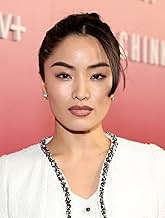Baseado no best-seller do New York Times, narra as esperanças e sonhos de uma família de imigrantes coreanos ao longo de quatro gerações enquanto deixam sua terra natal em uma busca para sob... Ler tudoBaseado no best-seller do New York Times, narra as esperanças e sonhos de uma família de imigrantes coreanos ao longo de quatro gerações enquanto deixam sua terra natal em uma busca para sobreviver e prosperar.Baseado no best-seller do New York Times, narra as esperanças e sonhos de uma família de imigrantes coreanos ao longo de quatro gerações enquanto deixam sua terra natal em uma busca para sobreviver e prosperar.
- Indicado para 1 Primetime Emmy
- 15 vitórias e 29 indicações no total
Explorar episódios
Avaliações em destaque
You know the actors are talented when they can draw you into a drama in a language you don't understand. Halfway through the first episode I was fully invested in the story, transported to another time and place, caring about the fate of the characters.
The story is universal - the struggle of a family to survive and live on in the next generation. It feels very authentic, the characters - even though they don't look like me or speak the same language - are people I know, people I can relate to.
I am enjoying the heck out of this series, and I can recommend it without reservation.
The story is universal - the struggle of a family to survive and live on in the next generation. It feels very authentic, the characters - even though they don't look like me or speak the same language - are people I know, people I can relate to.
I am enjoying the heck out of this series, and I can recommend it without reservation.
After watching the three episodes, I may deeply realize the artistic attainments of the director. The composition is beautiful, the picture is magnificent, and every frame is eye-catching. I can see that every actor has made a lot of efforts to shape the character. I believe that everyone who has experienced immigration can find resonance in it. Will continue to follow up on new episodes.
Great cinematography, indeed- also costumes, locations, etc- technically all perfect, and very good casting. The script does not follow the book, which changes the view on characters, giving them different vibe - and also the jumping timelineis done so often and sometimes in the middle of the scene, that it does not allow the build-up of atmosphere, is pushing so many characters at the same time and prevents the viewer to really get to know them. I believe a linear story line would have been more beneficial by allowing viewers to connect to the characters, immerse in the story and also illuminate the attitude of the next generation. It seems a bit rushed and does not really gives that feeling of the family saga. Special Kudos for Kim Minha, who nailed her first leading role, and excellent performance from Lee Min Ho was perfect in Hansu. They succeeded also in expressing the relation between their characters, which is not described even in the book as love, but as passion between a 40 years old man in a loveless marriage and an innocent teenager. Looking forward to see the next episodes !
Pachinko avoids the cliches of the K-drama, instead settles for an European soap drama style with plenty of depth, chronicling the plight of a Korean family under the Japanese occupation and juxtaposing that with life in 1989, all in brilliant cinematic storytelling.
This series does not shy away from the effects of Japan's forced occupation on Korea. It plays out with an emotional impact from the viewpoint of Sunja's life via the unique structure in blending timelines. From Sunja's youth under Japan's stranglehold to that of her grandson in 1989. It depicts the various stages of Japan's influences on Sunja's family life, from war torn times to the might of the financial impact that Japan displayed during the 80's.
It is an engrossing drama that reveals the horrors of life under a brutal occupation, and the long term effects it has on generational lives. All through the eyes of a strong protagonist, Sunja, played brilliantly by the various actors.
This series does not shy away from the effects of Japan's forced occupation on Korea. It plays out with an emotional impact from the viewpoint of Sunja's life via the unique structure in blending timelines. From Sunja's youth under Japan's stranglehold to that of her grandson in 1989. It depicts the various stages of Japan's influences on Sunja's family life, from war torn times to the might of the financial impact that Japan displayed during the 80's.
It is an engrossing drama that reveals the horrors of life under a brutal occupation, and the long term effects it has on generational lives. All through the eyes of a strong protagonist, Sunja, played brilliantly by the various actors.
When I first saw the trailers for this show my reaction was, oh no, another story about the struggles of poverty and war, and while there's a lot to that is told in a very interesting way where you can see the details of Korean lower class and it's interaction with the Japanese middle class.
I love reading subtitles to have the experience of the original actor/voice/culture so much is lost in dubbed scenes, and in this show they make sure you can understand when someone is speaking Japanese or Korean and why the miscommunication happens on normal circumstances.
The show subtitles Japanese in blue and Korean in yellow so it makes an unique experience, besides the dialogues and acting are very good.
This show explains to us (mainly westerners) the conflicts and collaborations between the Koreans and Japanese told from the Korean side and how they suffered the Japanese oppression but also how they thrived despite it, lovely show, can't wait for the second season.
I love reading subtitles to have the experience of the original actor/voice/culture so much is lost in dubbed scenes, and in this show they make sure you can understand when someone is speaking Japanese or Korean and why the miscommunication happens on normal circumstances.
The show subtitles Japanese in blue and Korean in yellow so it makes an unique experience, besides the dialogues and acting are very good.
This show explains to us (mainly westerners) the conflicts and collaborations between the Koreans and Japanese told from the Korean side and how they suffered the Japanese oppression but also how they thrived despite it, lovely show, can't wait for the second season.
Você sabia?
- CuriosidadesAccording to writer-creator Soo Hugh (a child of Korean immigrants) the series was four painstaking years in the making.
- Cenas durante ou pós-créditosThe opening titles are a montage of Sunja and her family dancing in a pachinko parlor, interspersed with footage of Korean immigrants across various decades.
- ConexõesFeatured in WatchMojo: Top 10 Best TV Shows of 2022 (2022)
Principais escolhas
Faça login para avaliar e ver a lista de recomendações personalizadas
- How many seasons does Pachinko have?Fornecido pela Alexa
Detalhes
- Tempo de duração55 minutos
- Cor
- Mixagem de som
- Proporção
- 2.20 : 1
Contribua para esta página
Sugerir uma alteração ou adicionar conteúdo ausente









































